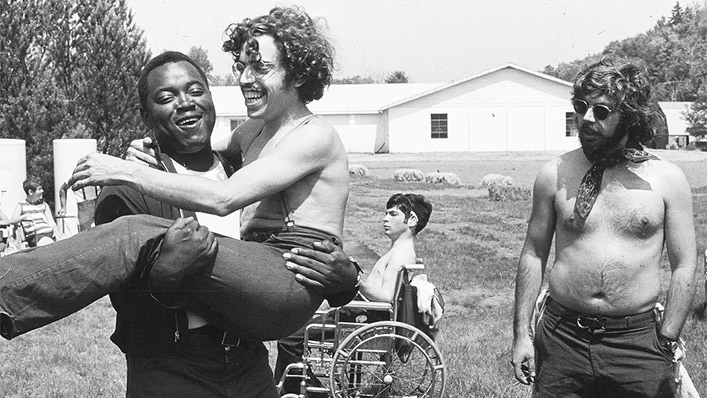Crip Camp is a heroic Netflix documentary, shining a light on a little-told story

Humanity shines through in Netflix’s new Obama-produced documentary Crip Camp, a powerful and inspiring film about the disability rights movement, says critic Travis Johnson.
The new Netflix documentary Crip Camp (the title is deliberately provocative) is not the film you think it is. Starting off as a nostalgic reminiscence of Camp Jened circa 1971, a New York State summer camp that catered to young people with physical and intellectual disabilities, at first taste directors James Lebrecht and Nicole Newnham seem to making a straight play for the heartstrings.
See also
* All new movies & series on Netflix
* All new streaming movies & series
There’s plenty of period interview footage of young handicapped people talking about how they felt free and accepted in the camp’s environs. “Inspiration porn”, a term coined by Australian disability activist Stella Young, is the phrase that comes to mind, and its surprising when you consider that Lebrecht himself is both disabled and a former camper.
There’s a bait-and-switch going on, though. And while you don’t exactly have to endure Crip Camp’s opening act – it’s an exceptionally well made film from go to whoa – it does take a little while for the work to reveal its true agenda, which is an account of the birth of the disability rights movement in America.
What impresses most about Crip Camp is the way the film firmly roots its events in the cultural context of the turbulent early ‘70s, drawing parallels between the disability rights movement and the civil rights movement, the anti-war movement, and more. It’s a righteously angry film, ultimately centring around the formation of the activist group Disabled in Action and the campaign for federally-mandated civil rights for the disabled, which climaxed with co-ordinated sit-ins and protests across 10 U.S. cities in 1977.
The change-up is impressive and impactful. Going in you hardly expect to be hearing stories about the mutual support that existed between Disabled in Action and the Black Panther Party, but that’s where we end up.
The courage of the film’s subjects, who include director Lebrecht himself and still-prominent disability rights advocate Judy Heumann, is never in question. It is certainly something to see a line of protesters in wheelchairs resolutely facing off against the cops sent to disperse them – a stark contrast with the cowardice displayed by then-President Jimmy Carter, who at one point is shown slipping out a side door rather than contend with the disabled protestors picketing his church.
Carter isn’t the only President in the mix here, with Barack Obama and his wife Michelle acting as executive producers on the film under their Higher Ground Productions banner. The film’s sense of justice and righteous outrage is very on brand for the man who campaigned on hope, but the unhappy campers who march for their rights are never reduced to mere symbols. Crip Camp is a delightfully earthy film, never forgetting that its subjects were, at least in the opening scenes at Camp Jened, horny teenagers let off the leash for the first time ever – one interviewee’s recollection of his first sexual experience is a show-stopper all on its own.
It’s that humanity that really shines through Crip Camp. It’s not exactly warts and all, but it goes to great lengths to depict its subject as fully rounded human beings, which does more to engender empathy and solidarity than any protest song or hand-lettered sign ever could. In an age of fictional derring-do, Crip Camp is a truly heroic film, shining a light on a little-told story of struggle and triumph.

















